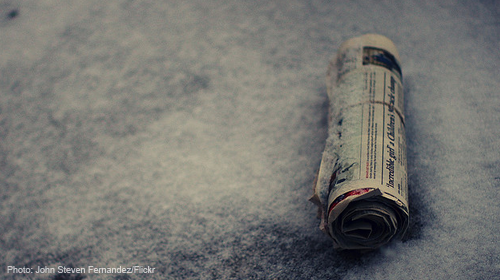
It’s been half a year since the Associated Press revealed a subpoena sweeping up phone metadata records for more than 20 of its lines, in offices where more than 100 reporters work, covering tens of thousands of newsgathering calls.
Members of the press (and me) seized on the story to decry the chilling effect the Obama administration’s aggressive “leak” investigations are having on the media. To date, hard evidence of that chill has been somewhat sparse. But a scathing by the Committee for Protection of Journalists makes clear that the chill is real and increasingly frigid.
The report, written by former Washington Post Executive Editor Leonard Downie, pulls no punches in its criticism of the Obama administration’s failure to abide by campaign promises to be the most transparent White House in recent memory. “The administration’s war on leaks and other efforts to control information are the most aggressive I’ve seen since the Nixon administration,” Downie, who covered Watergate, writes. “The 30 experienced Washington journalists at a variety of news organizations whom I interviewed for this report could not remember any precedent.”
Downie also details how the leak prosecutions are part of a larger message discipline effort at the White House. That effort includes the administration’s extensive use of social media and White House-produced news content as part of “a strategy, honed during Obama’s presidential campaign, to use the Internet to dispense to the public large amounts of favorable information and images generated by [the] administration, while limiting its exposure to probing by the press.”
He also helpfully links the administration’s focus on message discipline with the “” program reported by McClatchy in June. I wrote about how that initiative—which will require all cleared employees to receive training in how to recognize (unreliable) behavioral indicators of security threats—.
But the most disturbing passages are the first-hand accounts by national security reporters of sources drying up in direct response to the administration’s crackdown, especially as a result of the leak hunt piled on top of the NSA surveillance revelations. “People think they’re looking at reporters’ records,” The Washington Post national security reporter Dana Priest tells Downie. “I’m writing fewer things in e-mail. I’m even afraid to tell officials what I want to talk about because it’s all going into one giant computer.”
“Most people are deterred by those leaks prosecutions,” says Scott Shane at The New York Times. “They’re scared to death. There’s a gray zone between classified and unclassified information, and most sources were in that gray zone. Sources are now afraid to enter that gray zone.”
David Sanger, the Times reporter who broke news of the Stuxnet virus, the highly secretive cyber-weapon engineered to sabotage Iranian nuclear operations, was reportedly personally targeted for a freeze out. “A memo went out from the chief of staff a year ago to White House employees and the intelligence agencies that told people to freeze and retain any e-mail, and presumably phone logs, of communications with me,” Sanger told Downie. Longtime sources told Sanger, “David, I love you, but don’t e-mail me. Let’s don’t chat until this blows over.”
The report contains many other specific examples of this growing freeze on anonymously-sourced national security reporting. And that’s deeply concerning. The freedom of the press exists not to protect the Priests, Shanes, and Sangers of the world. It exists to protect us, the American people, who pay for and have a right to know what the government is doing in our name.
Ideally, the government would strive for balanced transparency. Truly sensitive national security information (like the Syrian war plans that were mysteriously leaked during the lead-up to a possible strike—to the benefit of the administration) would be classified, but there would be significant disincentive against over-classification.
Unfortunately, as James Madison wrote in the Federalist Papers, if “angels were to govern men, neither external nor internal controls on government would be necessary,” and a government of us, by nature, will always fall short of angelic. The most important external control is the press and the arctic chill detailed in this report should be of pressing concern to us all.
Learn more about the government surveillance and other civil liberties issues: Sign up for breaking news alerts, , and .


